The Three Pyramids Spread
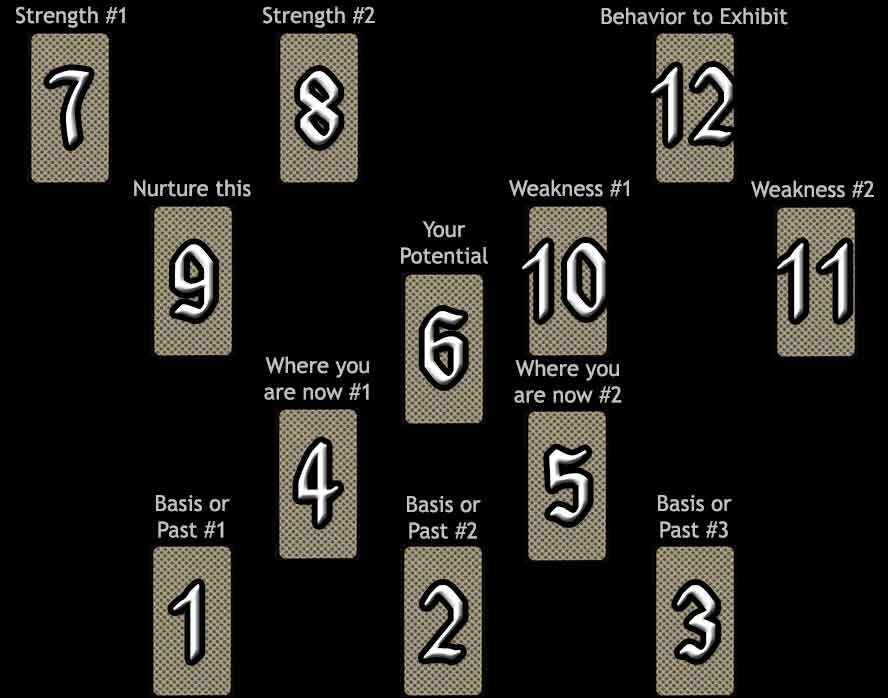
Difficulty: Complicated
Basically, there is the main pyramid in the centre, and two smaller pyramids on each side. One is inverted.
Positions 1 & 3 represent where the reader comes from, or what has made them/shaped them on the various levels. Can be from environment, upbringing, schooling, etc. A look at the past, but with more objectivity than is usually given when using tarot cards.
Positions 4 & 5 represent who the reader is right now. May or may not make pleasant reading, but hey, this is what this is about, right?
Position 6 represents who the reader could be. Again, it might or might not look good, but a person can learn from that and change who they are accordingly. (This is a bit like how Scrooge did things in 'A Christmas Carol'.)
Positions 7 & 8 are the reader's strengths. This is the light they have, which can be bought to the forefront. What carries the person should not be hidden or unacknowledged.
Position 9 represents what should be given to oneself or created within.
Position 10 & 11 represent personal areas for development or weaknesses. Again, might not make good reading, but if someone looks at their strengths first, they will be able to see a balance is there and can choose to focus on one side or the other. This is where a person could really see how their shadow side comes into play.
Position 12 represents what the reader should be offering externally, or what they can bring to their world or to others who inhabit that world.
Your Three Pyramids Reading
Strength #1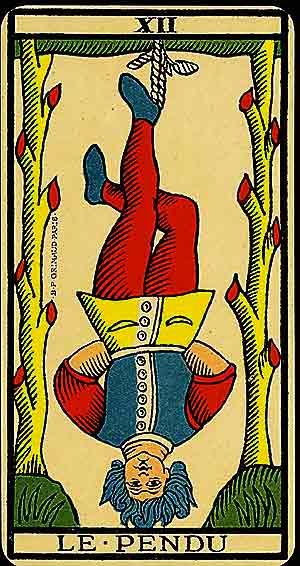 |
Strength #2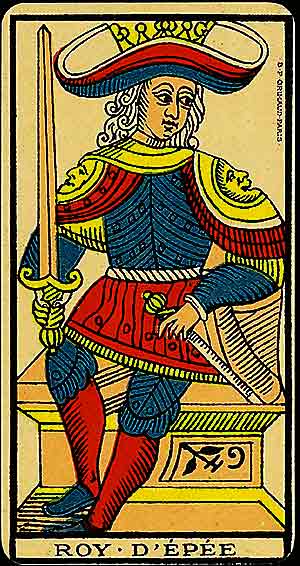 |
 |
Exhibit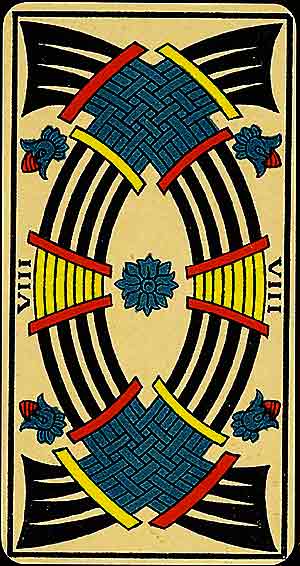 |
|||
Nurture This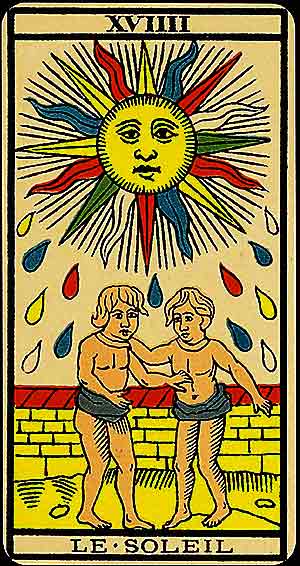 |
Potential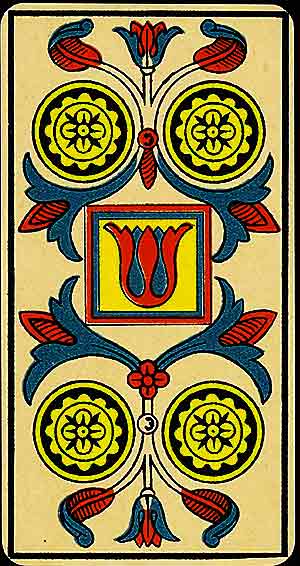 |
Infirmity #1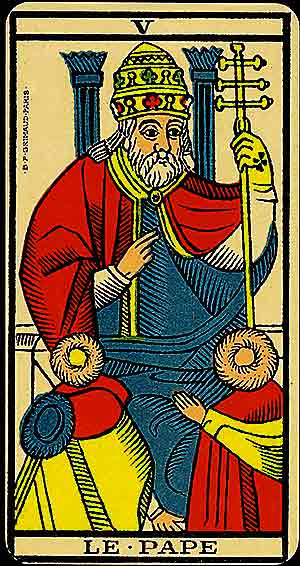 |
Infirmity #2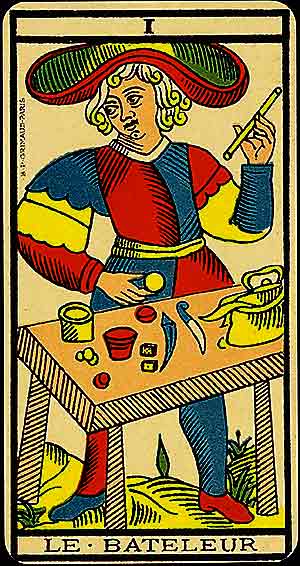 |
|||
Now #1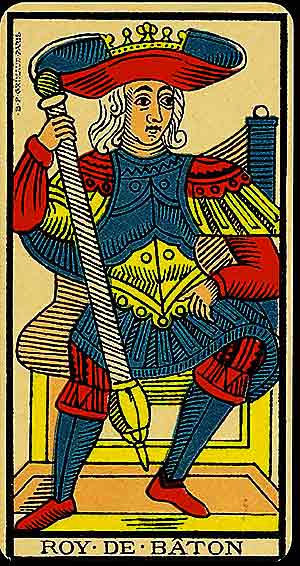 |
Now #2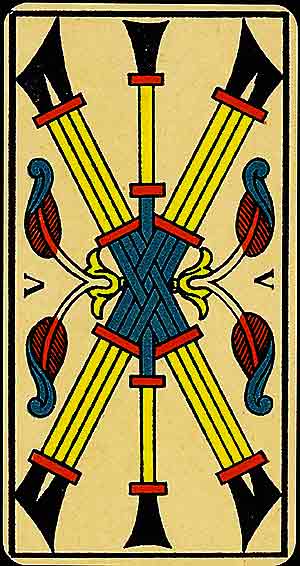 |
|||||
Base (past) #1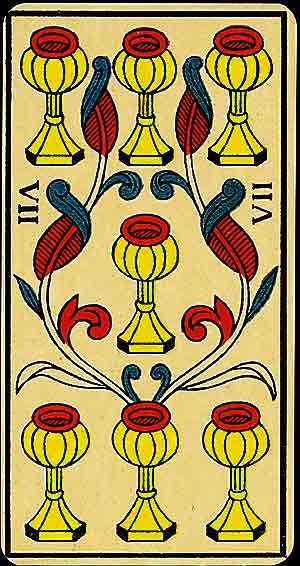 |
Base (past) #2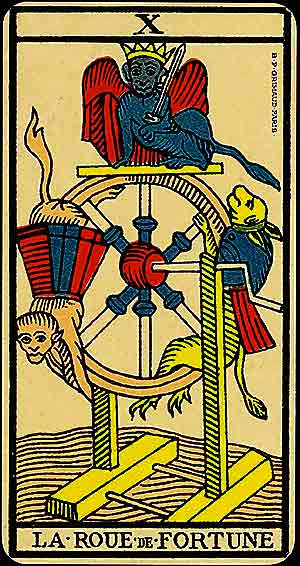 |
Base (past) #3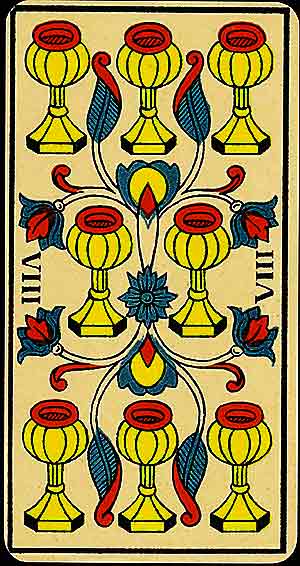 |
1: Base #1

The Seven of Cups represents imagination, choice, and the allure of possibilities. It warns of illusion and the importance of discernment when faced with multiple options.
Symbolism: Seven cups form an intricate pattern, their arrangement suggesting complexity and the uncertainty of choices. The floral embellishments evoke imagination and the pull of dreams, both promising and deceptive.
In Relationships: Idealisation of a partner or confusion about what you desire.
In Work: Opportunities arise, but careful evaluation is needed to separate genuine prospects from illusions.
Spiritually: The card reflects the richness of the inner world but calls for grounding and clarity in spiritual pursuits.
When ill-dignified: Overwhelm, fantasy, or escapism. It warns against being paralysed by options or losing touch with reality.
2: Base #2

The Wheel of Fortune symbolises the ever-turning cycles of life, fate, and destiny. It teaches the importance of adaptability and trust in the rhythms of change.
Symbolism: The wheel is adorned with figures ascending and descending, representing the rise and fall of fortunes. Its circular motion evokes the cyclical nature of existence, while divine forces implied by the card's design suggest that some aspects of life are beyond human control.
In Relationships: Changes in relationship dynamics or the appearance of new opportunities. Trust in the flow of events.
In Work: A shift in circumstances, often bringing unexpected opportunities. Stay flexible and open to change.
Spiritually: The Wheel of Fortune reflects the interconnectedness of life's cycles, encouraging surrender to the divine plan.
When ill-dignified: Resistance to change or clinging to outdated patterns. It warns of losing perspective during times of transition.
3: Base #3

The Eight of Cups signifies departure, emotional growth, and the courage to leave behind what no longer serves. It is a card of seeking deeper meaning.
Symbolism: This card shows cups arranged symmetrically, with intertwining vines and floral decorations. The structured yet somewhat rigid design reflects an order that may feel confining, symbolising the need to step away from stability for something more fulfilling. The central flower suggests a guiding light or inner calling, reinforcing the theme of seeking deeper meaning beyond the familiar.
In Relationships: Moving on from a relationship that no longer fulfils you or reassessing your emotional needs.
In Work: Leaving a secure position to pursue something more meaningful. Trust your instincts to guide you.
Spiritually: The card encourages the seeker to embark on a quest for truth, leaving behind superficial comforts.
When ill-dignified: Fear of change, stagnation, or clinging to the familiar. It warns against resisting the call to evolve.
4: Where you are now #1

The King of Batons signifies visionary leadership, mastery of creative energy, and the courage to inspire and guide others. This card represents the fulfilment of ambitions through determination and integrity.
Symbolism: Seated on a throne as a symbol of power and growth, the King holds his baton with authority, exuding confidence. His posture reflects a deep understanding of his role as a leader and creator.
In Relationships: It represents a strong, passionate partnership built on mutual respect and shared goals. The card encourages leading with strength and understanding.
In Work: The King symbolises ambition fulfilled through visionary action, inspiring others, and maintaining integrity. It encourages bold decision-making and confidence in your abilities.
Spiritually: The King reflects mastery of inner fire, urging the seeker to channel their spiritual energy into meaningful action and purpose.
When ill-dignified: Tyranny, arrogance, or a lack of empathy. It warns against using power selfishly or losing sight of the collaborative spirit of true leadership.
5: Where you are now #2

The Five of Batons symbolises conflict, competition, and the energy of creative tension. It challenges the seeker to navigate dynamic forces to achieve growth.
Symbolism: Five batons intersect in a crossing pattern, forming two triangles. Despite the opposition, leaves sprout at the junctions, suggesting that conflict can lead to creative breakthroughs.
In Relationships: Disagreements or challenges that require honest communication and compromise.
In Work: Competition or conflicting ideas in the workplace. Success comes through persistence and collaboration.
Spiritually: The card reflects internal struggles and the need to reconcile opposing desires to find clarity.
When ill-dignified: Escalating conflict, lack of cooperation, or destructive rivalry. It warns against letting tensions derail progress.
6: Your potential

The Four of Coins represents stability, security, and the consolidation of resources. The square flower in the centre suggests a firm foundation but also warns of rigidity or excessive attachment to material possessions.
Symbolism: Four coins form a square, symbolising solidity and structure. The simplicity of the arrangement reflects material grounding, while the lack of movement suggests potential stagnation.
In Relationships: A relationship built on stability, but one that may lack spontaneity. It calls for finding balance between security and emotional openness.
In Work: Financial or professional stability, but a need to avoid becoming overly conservative or resistant to growth.
Spiritually: The card invites you to ground yourself but warns against clinging too tightly to the material world.
When ill-dignified: Greed, possessiveness, or fear of loss. It warns against hoarding resources or stifling growth due to fear of change.
7: Strength #1

The Hanged Man represents surrender, perspective, and the wisdom gained through sacrifice. It signifies the pause required for deeper insight and the willingness to let go of attachments to achieve spiritual growth.
Symbolism: A figure hangs upside down from a grafted tree, forming an almost serene cross-like posture. The inversion suggests seeing the world from a different perspective, while the living tree structure reflects the connection to spiritual growth. His tranquil expression emphasises acceptance and enlightenment through suspension.
In Relationships: A need for patience, reflection, or a fresh perspective on a relationship. It can also suggest letting go of control.
In Work: A time to pause, reassess, and allow things to unfold. Solutions may come from viewing challenges differently.
Spiritually: The Hanged Man invites the seeker to embrace surrender as a path to awakening and profound understanding.
When ill-dignified: Stubbornness, resistance to change, or avoiding necessary sacrifices. It warns against remaining stuck in unproductive situations.
8: Strength #2

The King of Swords signifies mastery of intellect, clear judgement, and ethical leadership. He embodies the ability to make wise, logical decisions with fairness and authority.
Symbolism: Seated on a grand throne, the King holds a sword and sceptre, symbolising his command over logic and truth. The stark throne emphasises his focus, while his composed expression reflects impartiality and wisdom.
In Relationships: This card suggests rational communication, mutual respect, and emotional balance. It highlights the importance of trust and clear boundaries.
In Work: The King represents leadership through intellect and fairness. He encourages upholding moral integrity, making precise decisions, and inspiring respect in your field.
Spiritually: The King embodies mental mastery and the pursuit of clarity. He urges you to align your actions with truth and use intellect to guide spiritual growth.
When ill-dignified: Tyranny, inflexibility, or manipulation. It warns against becoming controlling, dogmatic, or disconnected from compassion.
9: Nurture this

The Sun represents joy, success, and clarity. It is the card of illumination and vitality, promising growth, harmony, and the fulfilment of goals through clarity and connection.
Symbolism: Two children stand joyfully under the radiant Sun, surrounded by a protective wall. The Sun itself symbolises divine energy and enlightenment, while the figures reflect innocence, unity, and shared happiness. The vibrant rays evoke abundance and the thriving life force.
In Relationships: Mutual happiness, harmony, and a joyful connection. Relationships flourish under the light of clarity and love.
In Work: Success and recognition achieved through positivity and effort. It suggests a time of clarity and accomplishment.
Spiritually: The Sun calls for embracing the light within and aligning with your true purpose, radiating joy and love outward.
When ill-dignified: Arrogance, burnout, or overexposure. It warns against taking blessings for granted or letting ego overshadow gratitude.
10: Weakness #1

The Hierophant bridges the earthly and the divine, symbolising tradition, spiritual guidance, and the transmission of sacred knowledge. He represents the connection between the seeker and a higher truth through structure and ritual.
Symbolism: The Hierophant sits between two pillars, a gesture of blessing extended towards two kneeling figures below him. His triple cross sceptre represents spiritual authority, while the two fingers pointing to his heart suggest access to divine mysteries. His serene expression reflects wisdom tempered with compassion.
In Relationships: A relationship built on shared values. It can also signify guidance or mentorship within a partnership.
In Work: Success through adherence to structure, tradition, or established methods. Seek advice from a mentor or institution.
Spiritually: The Hierophant invites the seeker to explore established spiritual paths, finding wisdom in teachings passed down through generations.
When ill-dignified: Dogmatism, resistance to change, or blind adherence to tradition. It warns against sacrificing individuality for conformity.
11: Weakness #2

The Magician represents skill, potential, and the power to shape reality. As the first step in the Major Arcana, he symbolises the individual's awareness of their tools and the initiation of personal mastery.
Symbolism: The table before him holds simple tools—a cup, a coin, a blade, and a wand—representing the raw elements of life and their mastery. His wide-brimmed hat, resembling the lemniscate, speaks of infinite potential and dynamic creativity. The uneven terrain below mirrors his capacity to balance uncertainty with control.
In Relationships: A time to take initiative or charm your way into new connections. The Magician highlights personal magnetism but warns against manipulation.
In Work: A signal to harness your skills and capitalise on emerging opportunities. Confidence and action are key.
Spiritually: The Magician is the bridge between spirit and matter, teaching you to use divine gifts responsibly.
When ill-dignified: Deception, arrogance, or scattered energy. It warns against using talents for selfish or destructive ends.
12: Behavior to exhibit

The Eight of Swords represents restriction, fear, and feeling trapped. It reflects limitations that are often self-imposed and calls for clarity and courage to break free.
Symbolism: Eight swords create a tightly woven, restrictive pattern. The intricate design evokes entrapment, yet the sprouting flowers suggest the possibility of growth through perseverance.
In Relationships: Feeling stuck or unable to express your emotions. It calls for open dialogue and introspection.
In Work: A sense of being overwhelmed or constrained by external pressures. Clarity and decisive action can release you.
Spiritually: The card urges the seeker to confront fears and release mental barriers on the path to freedom.
When ill-dignified: Paralysis by fear, victimhood, or refusal to take action. It warns against allowing self-doubt to control your life.